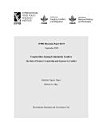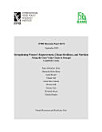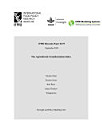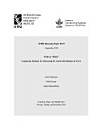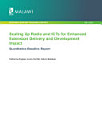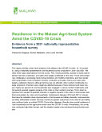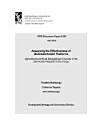Unlocking locally-led resilience amid conflict and climate stress: Views from community leaders in Mali on development priorities, aid distribution, and anticipatory action
Bleck, Jaimie · Carrillo, Lucia · Gottlieb, Jessica · Kosec, Katrina · Kyle, Jordan · Soumano, Moumouni
Oct 2024 · IFPRI Discussion Papers Book 2272 · Intl Food Policy Res Inst
5.0star
1 reviewreport
Ebook
65
Pages
family_home
Eligible
info
reportRatings and reviews aren’t verified Learn More
About this ebook
We surveyed 2,919 community leaders across seven regions of Mali to provide insights on the prevalence and severity of shocks and crises across localities; which types of shocks and crises are most difficult from which to recover; the formal and informal ways in which local actors are involved in aid distribution systems; and the types of programming local actors view as most beneficial for promoting resilience. Despite increasing prevalence of conflict across localities, leaders predominately cited climate-related shocks as the most difficult from which to recover— especially droughts. We find that localities vary in the inclusiveness of local governance around aid distribution: while elected mayors are almost always involved, traditional leaders, women’s group and youth leaders in villages, civil servants, and civil society leaders are each involved in 40–60% of localities. We used both a budget allocation exercise and an experimental game in which we introduced the concept of anticipatory action (AA) programming—aid that is “triggered” by an early warning signal to arrive before a shock and mitigate its worst effects—to probe preferences over aid modality. We found that leaders see value in balancing investment across resilience programming (including AA) and humanitarian response, especially food aid. However, there is some important variation between village- and commune-level officials: village-level leaders are more likely to prioritize aid modalities that target households directly, like food aid and cash transfers, while commune-level leaders are more likely to prioritize risk prevention trainings. Our findings have important policy implications for promoting local resilience in Mali, including the importance of investing more in drought resilience, engaging actors at different levels of local governance who have different information and perspectives, and simultaneously investing in capacity-building around early warning system accuracy and dissemination.
Ratings and reviews
5.0
1 review
Rate this ebook
Tell us what you think.
Reading information
Smartphones and tablets
Install the Google Play Books app for Android and iPad/iPhone. It syncs automatically with your account and allows you to read online or offline wherever you are.
Laptops and computers
You can listen to audiobooks purchased on Google Play using your computer's web browser.
eReaders and other devices
To read on e-ink devices like Kobo eReaders, you'll need to download a file and transfer it to your device. Follow the detailed Help Center instructions to transfer the files to supported eReaders.

